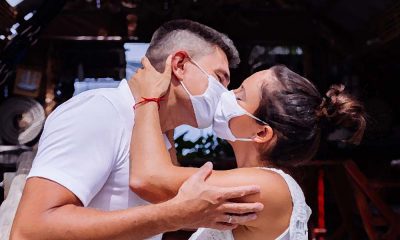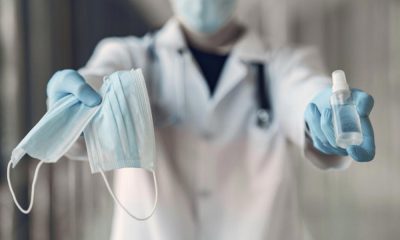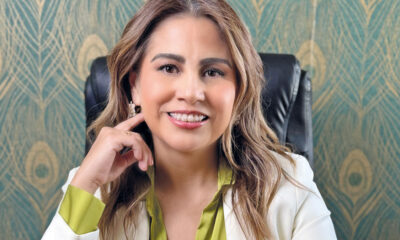Salud
No bajes la guardia contra el Covid-19
Publicado
5 años antesel

Mantener sana distancia, lavarse las manos con agua y jabón, utilizar gel con base de alcohol y usar cubrebocas, son las recomendaciones que durante los últimos 9 meses hemos tratado de acatar en cada momento de nuestra vida, pero ¿qué pasa cuando algo falla y tenemos sospecha de haber contraído Covid?
El médico pediatra Guillermo Garza Martínez se ha dedicado desde el mes de marzo a consultar también a pacientes adultos, quienes recurrieron a él al no saber qué hacer ante el miedo que provoca contraer el virus.
“Los papás de mis pacientes me empezaron a hablar para preguntarme que hacían. Empecé a estudiar, revisamos los protocolos internacionales y en base a eso seguimos tratando pacientes”, cuenta.
¿Qué es el Covid-19?
Aunque oímos hablar de él todos los días, el doctor Garza nos explica que el Covid-19 “es una infección viral que va a atacar todo nuestro sistema, principalmente los pulmones. Va a desencadenar una reacción inflamatoria muy severa y nuestro cuerpo en aras de defenderse de esta agresión empieza a producir una serie de sustancias que curiosamente nos van a empezar a dañar, y entre esos daños van a producir muchos coágulos por todas partes, en el cerebro, el corazón, los pulmones”.
Dicha reacción se complica mucho más si el paciente es obeso, diabético o hipertenso y no está controlado, por lo que va a desarrollar una serie de receptores en el cuerpo que hacen que el virus se adhiera a las células con mayor facilidad y esto haga que el daño sea mucho más grande.
Por lo anterior y pese a las recomendaciones que han hecho los organismos internacionales de salud, Garza opina que es mejor atender el caso desde los primeros síntomas y no cuando el paciente tenga dificultad para respirar.
“Yo nunca estuve de acuerdo en las indicaciones que nos dieron las autoridades a nivel mundial, de que si te sentías enfermo te quedaras en tu casa hasta tener dificultades respiratorias… ya para cuando tienen dificultad respiratoria la enfermedad está muy avanzada”.
Síntomas
Ante cualquier escenario, el médico nos sugiere estar atentos a los síntomas, los cuales pueden cambiar de un paciente a otro, pues estos no son exactos, ya que la enfermedad es muy insidiosa.
“Algunos empiezan con pura diarrea, otros empiezan con alteraciones conductuales, empiezan a estar muy deprimidos, muy ansiosos, muy nerviosos, la mayoría tienen sintomatología gripal. Característicamente esta enfermedad no da mucha fiebre a diferencia de la influenza que nos da fiebres muy altas desde la primera semana”.
Sobre las pruebas PCR para detectar el virus, el doctor nos dice que entre un 35 y 40 por ciento arrojan falsos negativos, es decir que, aunque una persona esté contagiada, la prueba puede fallar.
Tratamiento
Guillermo Garza afirma que la clave para vencer la enfermedad es mantener un cuerpo y una alimentación sanos, además de siempre practicar la medicina preventiva.
Nos cuenta que dentro de sus tratamientos incluye la quercetina, una sustancia que inhibe la replicación del virus y fortalece a los pulmones. “Esta se encuentra en cantidades muy importantes en las verduras verdes”, por lo que nos invita a comerlas hoy más que nunca, e insiste en que debemos de tener un estilo de vida saludable, “tenemos que comer bien, vitaminarnos, hacer ejercicio, tener buenos pensamientos, pues los pacientes que llegan tranquilos y son cooperadores son a los que les va bien, mientras que los que llegan estresados, nerviosos, tensos o no cooperadores es más fácil que les vaya mal”.
Cubrebocas
Pero antes de presentar síntomas y pensar en tratamientos, tenemos que acatar las medidas sanitarias, sobre todo una que podría salvarnos la vida, usar cubrebocas.
Este elemento de prevención -comenta el médico- es el mecanismo de protección más importante que tenemos después de un cuerpo sano; el cubrebocas ofrece una protección de un 93 o 94 por ciento, tanto como la vacuna, por lo que tenerlo siempre bien puesto es indispensable.
Consultas
Adultos con Covid-19 por consulta telefónica en los números 656-629-0613 o 656-227-1956
Pacientes pediátricos de forma presencial en el consultorio 535 del Hospital Ángeles, 5to. Piso
Don’t let your guard down against Covid-19
Maintaining a healthy distance, washing your hands with soap and water, using alcohol-based gel and using facemask, are the recommendations that during the last 9 months we have tried to follow in every moment of our lives, but what happens when something goes wrong and we suspect that we have Covid?
Since March, pediatrician Guillermo Garza Martinez has been consulting adult patients as well, who turned to him when they didn’t know what to do about the fear of contracting the virus.
“My patients’ parents started talking to me to ask me what to do. I began to study, I reviewed the international protocols and based on that we continued to treat patients,” he says.
What is Covid-19?
Although we hear about it every day, Dr. Garza explains that Covid-19 “is a viral infection that will attack our entire system, mainly the lungs. It’s going to trigger a very severe inflammatory reaction and our body, in order to defend itself from this aggression, begins to produce a series of substances that, curiously enough, are going to start damaging us, and among these damages, they are going to produce many clots everywhere, in the brain, the heart, the lungs”.
This reaction becomes much more complicated if the patient is obese, diabetic or hypertensive and is not controlled, so he will develop a series of receptors in the body that make it easier for the virus to adhere to the cells and this will cause the damage to be bigger.
Because of this and despite the recommendations made by international health organizations, Garza believes it is better to treat the case from the first symptoms and not when the patient has difficulty breathing.
“I never agreed with the indications given to us by authorities worldwide that if you felt ill you should stay home until you had breathing difficulties… by the time you have breathing difficulties the disease is very advanced”.
Symptoms
Before any scenario, the doctor suggests us to be attentive to the symptoms, which can change from one patient to another, because these are not exact, since the disease is very insidious.
“Some begin with pure diarrhea, others begin with behavioral alterations, they begin to be very depressed, very anxious, very nervous, most have flu-like symptoms. This disease does not give much fever unlike influenza that gives us very high fevers from the first week.
Regarding the PCR tests to detect the virus, the doctor tells us that between 35 and 40 percent give false negatives, that is to say that even if a person is infected, the test can fail.
Treatment
Guillermo Garza states that the key to defeating the disease is to maintain a healthy body and diet, in addition to always practicing preventive medicine.
He tells us that his treatments include quercetin, a substance that inhibits the virus replication and strengthens the lungs. “This is found in green vegetables in very important quantities”, so he invites us to eat them today more than ever, and insists that we must have a healthy lifestyle, “we must eat well, take vitamins, exercise, have good thoughts, because patients who arrive calmly and are cooperative are the ones who do well, while those who arrive stressed, nervous, tense or uncooperative are easier to do badly”.
Facemask
But before presenting symptoms and thinking about treatments, we have to abide by sanitary measures, especially one that could save our lives, using mouth guards.
This preventive element -the doctor says- is the most important protection mechanism we have after a healthy body; the mask offers a protection of 93 or 94 percent, as much as the vaccine, so having it always on is indispensable.
Consultations
Adults with Covid-19 by telephone consultation at 656-629-0613 o 656-227-1956
Pediatric patients at the Hospital Ángeles, 5th Floor, Room 535
Te puede interesar

Relaciónate sanamente con tus alimentos durante estas vacaciones; valora tanto el placer como la conciencia de elegir opciones saludables
Como ya sabemos, las vacaciones suelen ser sinónimo de descanso, familia, amigos y comida, lo que hace casi imposible pensar en cuidarnos o ser saludables. Pero ¿y si cuidarse también incluyera disfrutar?
Como nutrióloga te diré que comer de forma saludable no es sinónimo de restricciones, de dietas estrictas o de privarte de alimentos que te agradan. Comer saludable es un equilibrio que busca llevar una relación positiva con la comida, consumiendo alimentos con buen aporte nutricional, pero sin dejar de disfrutar de tus comidas favoritas.
Con este artículo más que darte consejos para ser saludable en vacaciones, te invito a modificar la forma en la que te relaciones con tus alimentos.
1. Escucha a tu cuerpo
La gran mayoría durante esta temporada no sigue una dieta o plan alimenticio, así que, aprender a comer con atención y escuchar a tu cuerpo (cuando tiene hambre y cuando está satisfecho) es la mejor solución sea cual sea la comida.
2. Ordena tus alimentos
En tu plato, empieza con las verduras, luego proteínas (pollo, carne, pescado, huevo, leguminosas), seguido de las grasas (aguacate, nueces, almendras) y por último carbohidratos (pan, arroz, pasta, tortillas), esto te ayudara a aumentar la saciedad y mejorar la digestión.
3. Hidrátate bien
Es importante beber 8 vasos de agua al día, pudiendo incluir tes e infusiones (sin azúcar) para evitar la deshidratación.
4. Muévete con libertad
Camina, explora, conoce, pero siempre procura mantenerte activo, esto te ayudará con la digestión mejorando la motilidad intestinal.
5. Elige con intención y no con culpa
Si vas a darte un gusto, hazlo con plena conciencia y disfrútalo sin remordimientos. Ten en cuenta que un alimento fuera de lo saludable no arruina el proceso, pero una mala alimentación prolongada sí.
Recuerda que en estas vacaciones buscamos nutrir nuestro cuerpo, pero también alimentar el alma.
The Art of Taking Care of Yourself Without Missing Out on Enjoyment
Build a healthy relationship with food during the holidays—honor both the pleasure and the awareness of choosing healthy options.
As we all know, vacations are usually synonymous with rest, family, friends, and food—which makes it almost impossible to think about staying healthy or taking care of ourselves. But what if self-care could also include enjoyment?
As a nutritionist, I can tell you that eating healthily doesn’t mean restriction, strict diets, or depriving yourself of foods you enjoy. Healthy eating is about balance—it means developing a positive relationship with food, choosing items with good nutritional value without giving up your favorite meals.
Rather than offering traditional health tips for vacation, this article invites you to rethink your relationship with food.
1. Listen to Your Body
Most people don’t follow a specific diet or meal plan during this time of year. So, the best solution, no matter what you’re eating, is to practice mindful eating—listen to your body, recognize when you’re hungry, and stop when you’re satisfied.
2. Organize Your Meals
When building your plate, start with vegetables, then move to proteins (chicken, meat, fish, eggs, legumes), followed by fats (avocado, nuts, almonds), and finally carbohydrates (bread, rice, pasta, tortillas). This helps increase satiety and improve digestion.
3. Stay Hydrated
It’s important to drink at least 8 glasses of water a day. You can also include teas and infusions (without sugar) to avoid dehydration.
4. Move Freely
Walk, explore, sightsee—but always try to stay active. Movement helps your digestion and improves intestinal motility.
5. Choose Intentionally, Not Out of Guilt
If you’re going to indulge, do it consciously and without remorse. Remember: one “unhealthy” meal won’t ruin your progress, but prolonged unhealthy habits can.
Remember: This vacation, aim to nourish your body—but also feed your soul.

Descubre qué es el brainrot y cómo lo afecta tu teléfono
¿Cuántas veces has agarrado el celular y no recuerdas para qué fue que lo tomaste?;
¿Cuántas veces, ya que lo tienes en la mano y recordaste para que lo agarraste, te llega una notificación de tus redes, entras y sin darte cuenta ya pasaste más de 15 minutos revisando el feed, y de pronto, como que una “revelación” llega de nuevo a tu mente que te recuerda para qué fue que tomaste el cel, sales del feed para realizar lo que harías, y ya estando en la aplicación que usarías, olvidas de nuevo para qué estás ahí?
¡A mí me ha pasado infinidad de veces! Pensé que quizás era por mi edad, por los embarazos, por las hormonas, por los “efectos del COVID”, bueno hasta pensé que era por los problemas con mi marido, pero la verdad de las cosas, es que esto es una consecuencia por el excesivo uso de redes sociales que provoca lo que ahora se conoce como la “epidemia del BRAINROT”.
Pero ¿qué es esto?,
sígueme leyendo, te platico. El “brainrot” conocido también como podredumbre de cerebro, específicamente hace referencia al contenido no educativo que consume tu atención, no te aporta valor real, y genera una sensación de embotamiento mental, disminuyendo así tu capacidad de concentración.
¿Cómo afecta el brainrot a tu cerebro?
Según investigaciones han demostrado que el consumo excesivo de contenido superficial o negativo reduce la materia gris en la corteza pre frontal, la cual es la parte del cerebro encargada de la toma de decisiones, control de impulsos y resolución de problemas; disminuye tu capacidad de atención, debilita tu memoria, aumento de ansiedad y depresión, entre otros.
No te asustes, mejor toma medidas; por ejemplo establece límites de tiempo, desactiva notificaciones, has actividades offline como leer un libro (la biblia por ejemplo), has ejercicio y socializa sin pantallas! La vida es tan corta y bella que vale la pena invertir tiempo de calidad en ella. Grissell Guel.
Social Media Disease
Discover what brairot is and how your phone affects it
How many times have you picked up your phone and can’t remember why you picked it up?
The scene continues… as soon as you have it in your hand and remember what you picked it up for, you get a notification from your social media feed. You log in and, without realizing it, you’ve spent more than 15 minutes scrolling through your feed. However, suddenly, like a “revelation,” it hits you why you picked it up.
Then you exit the feed to do what you had to do, and once you’re in the app you were supposed to use, you forget again why you’re there.
Did that sound familiar? It happens to me countless times.
In my case, I thought it was because of my age, pregnancies, hormones, the “effects of Covid.” Well, I even thought it was because of problems with my husband, but the truth is, this is just a consequence of excessive social media use, causing what is now known as the “brainrot epidemic.”
What’s this?
Brainrot, specifically refers to non-educational content that consumes your attention, provides no real value, and creates a feeling of mental dullness, thus diminishing your ability to concentrate.
How does it affect your brain?
According to research, excessive consumption of superficial or negative content reduces the gray matter in the prefrontal cortex, the part of the brain responsible for decision-making, impulse control, and problem-solving. It decreases your attention span, weakens your memory, and increases anxiety and depression, among other factors.
Don’t panic; take immediate action: set time limits, turn off notifications, do offline activities like reading a book (the Bible, for example), exercise, and socialize without screens.
Life is so short and beautiful that it’s worth investing in quality time.

Acudir al doctor durante esta etapa disminuye el riesgo de problemas antes y durante la gestación, tanto para la madre como para el hijo
Tener un embarazo saludable es una de las mejores maneras de promover un nacimiento sano, para lograrlo debemos llevar un control adecuado previo y durante la gestación.
¿Qué son los cuidados previos?
Es el cuidado médico que recibe una mujer antes de quedar embarazada. Para las que están considerando embarazarse, acudir a control médico puede disminuir el riesgo de tener problemas durante el embarazo o después del parto con alteraciones perjudiciales duraderos para el bebé.
Medidas a considerar
1. Elaborar un plan para la vida reproductiva de la paciente y su pareja con respecto al número de hijos y en qué momento tenerlos relacionado a objetivos de vida
2. Llevar una dieta y un estilo de vida saludable
3. Asegurarse de tener las vacunas adecuadas
4. Ingesta de ácido fólico: consumir 0.4 mg al día de ácido fólico tres meses antes de un embarazo y tres meses después de concebir, puede reducir el riesgo de espina bífida u otros defectos del tubo neural
5. Control de un padecimiento (hipertensión, diabetes, hipotiroidismo y otros)
6. Evitar fumar, beber alcohol, consumir fármacos/ drogas
7. Tratar de alcanzar un peso saludable, ya que pone en riesgo el tener complicaciones durante el embarazo (presión alta, preeclampsia, diabetes gestacional y muerte materno fetal)
8. Conocer sobre sus antecedentes de Salud Mental Familiar y de su pareja
¿Qué son los cuidados prenatales?
Son los cuidados médicos que recibe una mujer durante el embarazo, deben iniciarse en cuanto sepa de su embarazo. Las visitas prenatales son importantes para la salud tanto de la mamá como la del feto. Una mujer que no recibe cuidado prenatal tiene tres veces más probabilidades de tener un bebé con bajo peso al nacer y también puede aumentar el riesgo de muerte del bebé.
¿Cómo es el control?
El seguimiento del embarazo se realiza con regularidad y frecuencia para vigilar posibles alteraciones o trastornos que puedan identificarse antes de complicarse. La frecuencia de las visitas varía según el grado de riesgo que presenta el embarazo y la madre. Por lo general en la cita se realizan varias pruebas a las mujeres como control de peso, toma de presión arterial, análisis de sangre y orina, así como ultrasonidos.
En México, cada año se embarazan un promedio de un millón y medio de personas, del 5 al 10% no acude a control prenatal; situación que pone en riesgo la salud de la madre y de su hijo.
El 85% de los embarazos llegan a término sin complicaciones El 15% son de alto riesgo, algunos terminan en abortos espontáneos, partos pretérmino o prematuro, según el Hospital General México.
Pregnancy planning and preparation
Seeing the doctor during this stage reduces the risk of problems before and during pregnancy, for both mother and child.
Having a healthy pregnancy is one of the best ways to promote a healthy birth. To achieve this, we must maintain adequate monitoring before and during pregnancy.
What is prenatal care?
It is the medical care a woman receives before becoming pregnant. For those considering pregnancy, seeking medical care can reduce the risk of problems during pregnancy or after delivery that could be harmful to the baby.
Measures to Consider
1. Develop a reproductive life plan for the patient and her partner regarding the number of children and timing of their childbearing, in relation to life goals.
2. Maintain a healthy diet and lifestyle.
3. Ensure adequate vaccinations.
4. Folic acid intake: Consuming 0.4 mg of folic acid daily three months before pregnancy and three months after conception can reduce the risk of spina bifida or other neural tube defects.
5. Manage a medical condition (hypertension, diabetes, hypothyroidism, and others).
6. Avoid smoking, drinking alcohol, and using medications.
7. Aim for a healthy weight, as this increases the risk of complications during pregnancy (high blood pressure, preeclampsia, gestational diabetes, and maternal and fetal death).
8. Learn about your family’s and your partner’s mental health history.
What is prenatal care?
It is the medical care a woman receives during pregnancy and should begin as soon as she learns she is pregnant. Prenatal visits are important for the health of both the mother and the fetus. A woman who does not receive prenatal care is three times more likely to have a low-birth-weight baby and may also increase the risk of stillbirth.
What is the checkup like?
Pregnancy monitoring is performed regularly and frequently to monitor for possible alterations or disorders that can be identified before complications develop. The frequency of visits varies depending on the degree of risk posed by the pregnancy and the mother. Typically, women undergo several tests during the appointment, such as weight monitoring, blood pressure measurements, blood and urine tests, and ultrasounds.
In Mexico, an average of 1.5 million people become pregnant each year; 5 to 10% do not attend prenatal care, a situation that puts the health of both the mother and her child at risk.
85% of pregnancies reach term without complications. 15% are high risk, some ending in miscarriages, preterm births, or premature births, according to the Hospital General México.














